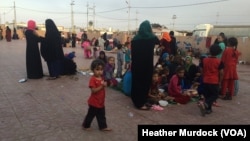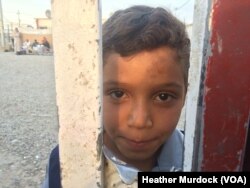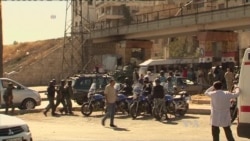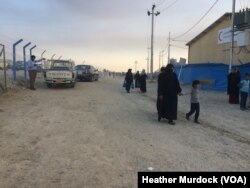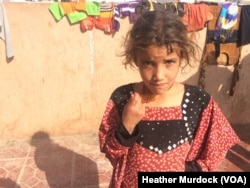Without prompting, 10-year-old Maha rattled off her story as if she had told it several times before: Her father is in jail now, after he was attacked by Islamic State fighters and later accused of joining them.
"He was beaten so bad he couldn’t walk," she said to anyone who would listen.
Across this camp of more than 30,000 displaced people, families had stories of ruined relationships and lives, property destroyed and ghastly trauma.
On Thursday, Iraqi Prime Minister Haider al-Abadi said forces were moving faster than expected toward Mosul. Islamic State (IS) militants have been in control of the country’s second-largest city for more than two years.
Despite fears that a million more people may soon flee the city, cracking an already strained aid system, displaced families here said, for them, the final battle cannot come soon enough.
"We hear from the people we know still in Mosul that they just want Islamic State militants to be gone at any cost," said Umar, a former autoworker who went back into IS territory when the militant group demanded that residents working out of town return or their families would be killed. He gathered his children and fled.
"They are ready for the militants to get out, at any cost,” he repeated, about ridding Mosul of IS.
Layla, a mother of three, has been living at the camp for three months. Her two daughters, ages 15 and 16, were kidnapped and are being held by IS. Her son, accused of being an IS member, is in prison.
"When Mosul is free, I will go on camera and tell everything," she said.
Unprepared
The Debaga camps, about 50 kilometers from the nearest battleground, are filled to capacity, said Rzgar Abed, a senior manager with the Barzani Charity Foundation.
The camps are not prepared to handle a large influx of traumatized, desperate people, but they keep coming, Abed said. After they arrive, they can wait up to a week just to get a tent or a mattress, he added.
However, delaying the rush of people by leaving IS in place would be worse than the looming crisis, he said.
"As long as the operations drag on, there will be more displaced families," Abed said. "Winter is soon coming, and it will be a big problem. We can’t provide homes for all of them."
His organization and others are scrambling to get funding for emergency camps, he added.
"The Mosul campaign, in a worst-case scenario, is expected to be the largest and most complex humanitarian operation in the world in 2016 due to mass forced displacement of people fleeing military operations," the International Organization for Migration said on its website Thursday.
Over the next 45 days, the organization is planning on overseeing the building of 7,500 plots to house displaced families. Initially, these structures will only offer the most basic services, such as shelter, water and sanitation, the organization said.
But with nowhere left to run, the camp's residents insist the only way out of the disaster is not more aid but the defeat of IS militants.
Outside a former schoolhouse now packed with newly arrived women and children, 27-year-old Ibrahim explained that for families like his, there will never be a resolution.
His 19-year-old brother joined the IS militants for reasons he didn’t understand and later threatened to kill his family. Their father was livid, shouting at his son for even considered joining the group.
"If he is killed in the battle, I will cry," Ibrahim said. "But he went willingly."




